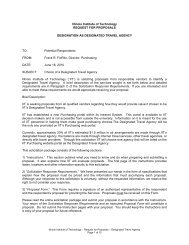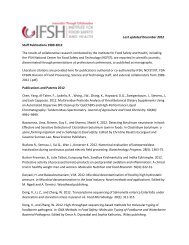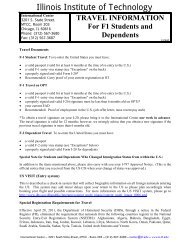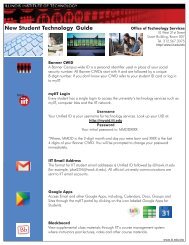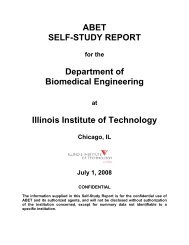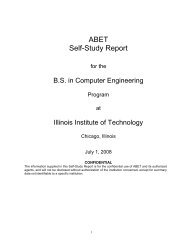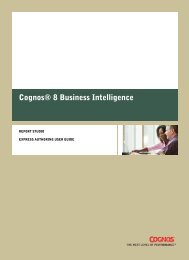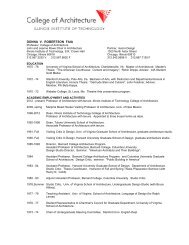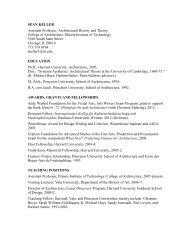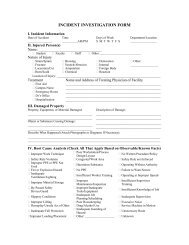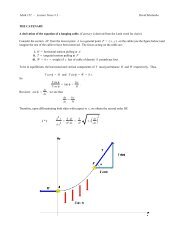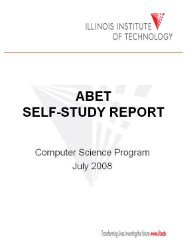Copyright & Disclaimer Information - Illinois Institute of Technology
Copyright & Disclaimer Information - Illinois Institute of Technology
Copyright & Disclaimer Information - Illinois Institute of Technology
You also want an ePaper? Increase the reach of your titles
YUMPU automatically turns print PDFs into web optimized ePapers that Google loves.
174<br />
Course Descriptions<br />
CS 429<br />
<strong>Information</strong> Retrieval<br />
Overview <strong>of</strong> fundamental issues <strong>of</strong><br />
information retrieval with theoretical<br />
foundations. The informationretrieval<br />
techniques and theory, covering<br />
both effectiveness and run-time<br />
performance <strong>of</strong> information- retrieval<br />
systems are covered. The focus is on<br />
algorithms and heuristics used to<br />
find documents relevant to the user<br />
request and to find them fast. The<br />
course covers the architecture and<br />
components <strong>of</strong> the search engine<br />
such as parser, stemmer, index<br />
builder, and query processor.The students<br />
learn the material by building<br />
a prototype <strong>of</strong> such a search engine.<br />
Prerequisite: CS 331 or CS 401 and<br />
strong programming knowledge.<br />
(3-0-3) (T) (C)<br />
CS 430<br />
Introduction to Algorithms<br />
Introduction to the design, behavior<br />
and analysis <strong>of</strong> computer algorithms.<br />
Searching, sorting and combinatorial<br />
algorithms are emphasized. Worst<br />
case and average bounds on time and<br />
space usage. Prerequisites: (CS 330<br />
or MATH 230) and CS 331; or CS<br />
401 or CS 403. (3-0-3) (T) (C)<br />
CS 440<br />
Programming Languages and Translators<br />
Study <strong>of</strong> commonly used computer<br />
programming languages with an<br />
emphasis on precision <strong>of</strong> definition<br />
and facility in use. Scanning, parsing<br />
and introduction to compiler design.<br />
Use <strong>of</strong> compiler generating tools.<br />
Prerequisites: (CS 330 or MATH 230<br />
and CS 351); or CS 401 or CS 403.<br />
(3-0-3) (T)<br />
CS 441<br />
Current Topics in Programming Languages<br />
New topics in programming language<br />
design such as concepts <strong>of</strong> concurrent<br />
and distributed programming, communicating<br />
sequential processes, and<br />
functional programming. System<br />
development tools and language features<br />
for programming. Introduction<br />
to programming language semantics.<br />
Prerequisite: CS 331 or CS 401 or<br />
CS 403. (3-0-3) (T)<br />
<strong>Copyright</strong> & <strong>Disclaimer</strong> <strong>Information</strong>: <strong>Copyright</strong> © 1994, 1995, 1996, 1997, 1998, 1999, 2000, 2001, 2002, 2003, 2004, 2005, 2006, 2007. CollegeSource®, Inc. and Career Guidance Foundation. CollegeSource® digital catalogs are derivative works owned and copyrighted by CollegeSource®, Inc. and Career Guidance Foundation. Catalog content is owned and copyrighted by the appropriate school. While CollegeSource®, Inc. and Career Guidance Foundation provides information as a service to the public, copyright is retained on all digital catalogs.<br />
<strong>Copyright</strong> & <strong>Disclaimer</strong> <strong>Information</strong>: <strong>Copyright</strong> © 1994, 1995, 1996, 1997, 1998, 1999, 2000, 2001, 2002, 2003, 2004, 2005, 2006, 2007. CollegeSource®, Inc. and Career Guidance Foundation. CollegeSource® digital catalogs are derivative works owned and copyrighted by CollegeSource®, Inc. and Career Guidance Foundation. Catalog content is owned and copyrighted by the appropriate school. While CollegeSource®, Inc. and Career Guidance Foundation provides information as a service to the public, copyright is retained on all digital catalogs.<br />
CS 445<br />
Object-Oriented Design and Programming<br />
Introduction to methodologies for<br />
object-oriented design and programming.<br />
Examines the object model and<br />
how it is realized in various objectoriented<br />
languages. Focuses on<br />
methods for developing and implementing<br />
object-oriented systems.<br />
Prerequisite: CS 331 or CS 401 or CS<br />
403. (3-0-3) (T)<br />
CS 447<br />
Distributed Objects<br />
This course provides an introduction<br />
to the architecture, analysis, design,<br />
and implementation <strong>of</strong> distributed,<br />
multi-tier applications using distributed<br />
object technology. The course<br />
focuses on the services and facilities<br />
provided by an Object Request<br />
Broker (ORB). Students will use a<br />
commercially available ORB and<br />
Database Management System to<br />
develop distributed object applications.<br />
Prerequisite: CS 445. (3-0-3)<br />
(T) (C)<br />
CS 450<br />
Operating Systems<br />
Introduction to operating system concepts,<br />
including system organization<br />
for uniprocessors and multiprocessors,<br />
scheduling algorithms, process<br />
management, deadlocks, paging and<br />
segmentation, files and protection,<br />
and process coordination and communication.<br />
Prerequisites: (CS 331<br />
and CS 350) or (CS 331 and ECE<br />
242) or (CS 401 and CS 402) or CS<br />
403. (3-0-3) (T)<br />
CS 455<br />
Data Communications<br />
Introduction to data communication<br />
concepts and facilities with an<br />
emphasis on protocols and interface<br />
specifications. Focuses on the lower<br />
four layers <strong>of</strong> the ISO-OSI reference<br />
model. Prerequisite: CS 450. (3-0-3) (T)<br />
CS 458<br />
<strong>Information</strong> Security<br />
An introduction to the fundamentals<br />
<strong>of</strong> computer and information security.<br />
This course focuses on algorithms<br />
and techniques used to defend<br />
against malicious s<strong>of</strong>tware. Topics<br />
include an introduction to encryption<br />
IIT Undergraduate Bulletin 2006–2008<br />
systems, operating system security,<br />
database security, network security,<br />
system threats, and risk avoidance<br />
procedures. Prerequisites: CS 425<br />
and CS 450 (3-0-3) (T) (C)<br />
CS 470<br />
Computer Architecture<br />
Introduction to the functional elements<br />
and structures <strong>of</strong> digital computers.<br />
Detailed study <strong>of</strong> specific<br />
machines at the register transfer<br />
level illustrates arithmetic, memory,<br />
I/O and instruction processing.<br />
Prerequisites: (CS 350 or ECE 242)<br />
and ECE 218. (2-2-3) (T) (C)<br />
CS 480<br />
Artificial Intelligence<br />
Styles <strong>of</strong> programming and s<strong>of</strong>tware<br />
engineering with applications to artificial<br />
intelligence and to the creation<br />
<strong>of</strong> good programming environments<br />
through the use <strong>of</strong> key ingredients <strong>of</strong><br />
these styles. These include techniques<br />
<strong>of</strong> search, data-driven programming,<br />
demons, frames, objectoriented<br />
program-ming, productionrule<br />
systems, logic programming,<br />
and code that constructs code including<br />
language-extension through<br />
macros. Prerequisite: CS 331 or CS<br />
401 or CS 403. (3-0-3) (T)<br />
CS 481<br />
Intelligent Text Analysis for Knowledge<br />
Management<br />
This course is about how to build systems<br />
that analyze unstructured natural<br />
language texts and extract useful<br />
information from them. This<br />
course will cover a variety <strong>of</strong> existing<br />
text analysis and text mining systems<br />
and discuss them in depth.<br />
Prerequisites: MATH 474 and (CS<br />
422 or CS 429 or CS 480). (3-0-3) (T)<br />
CS 482<br />
<strong>Information</strong> and Knowledge Management Systems<br />
This Capstone course is designed as a<br />
project course whose purpose is to<br />
enable students to see how various<br />
algorithms and systems from the prerequisite<br />
courses can be used in context<br />
to create useful knowledge management<br />
tools. Class periods will be<br />
divided among discussion <strong>of</strong> design <strong>of</strong><br />
information and knowledge management<br />
systems, lectures on effective



